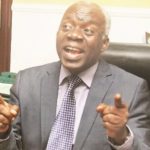NIGERIA’S financial system has remained stable and resilient in spite of the macroeconomic shock and stress brought about by COVID-19 because of the proactive measures, supervision and support of the regulatory authorities.
The Managing Director/Chief Executive of the Nigeria Deposit Insurance Corporation (NDIC), Bello Hassan, disclosed this at the opening ceremony of a three-day retreat organised by the corporation for members of the House of Representatives Committee on Insurance and Actuarial Matters in Lagos.
This is even as the Corporation has announced that it would commence the verification of claims by depositors of three Micro-finance Banks (MFBs) whose licences were revoked by the Central Bank of Nigeria (CBN) from today.
The failed banks include; Gufax MFB, Sapphire MFB, both in Uyo, Akwa Ibom State, and ICB MFB in Asaba, Delta State.The agency confirmed this in a statement posted on its official Twitter handle.
Meanwhile, Bello noted that the sustainable growth of any economy, whether developing or developed, would largely depend on the resilience and stability of its financial sector.
“The macroeconomic shock and stress brought about by COVID-19 are unprecedented. It has been recognised as the ultimate test of resilience so far to financial systems. As evidenced by the financial soundness indicators, Nigerian banks have remained resilient, by being safe, stable and sound in spite of the challenges posed by the COVID-19 pandemic. This success was due largely to the proactive policies and support of the regulatory authorities.”
The aim of the workshop, with the theme, ‘Deposit insurance in Nigeria: Re-strategising for tomorrow,’ was to strengthen relationships with stakeholders and explore ways to help lawmakers know the Corporation’s problems towards amending the NDIC Act.
According to him, the Corporation has enhanced collaboration with relevant stakeholders like the National Assembly, Federal Ministry of Finance, Budget & National Planning, the Judiciary and the Central Bank of Nigeria (CBN) on almost all relevant activities.
The NDIC boss listed some of the measures taken by NDIC as one of the regulators to strengthen the deposit insurance system in the country to include; the migration to the Differential Premium Assessment System (DPAS) from the flat-rate method of assessing and collecting premiums with a view to aligning the pricing of deposit insurance to the risk profile of individual banks; the collaboration with the CBN to shift from the compliance-based examination to Risk-Based Supervision (RBS) and the adherence to corporate governance principles in the banks; among others.
NDIC, according to Bello, is embarking on robust collaboration and cooperation with relevant stakeholders, other deposit insurance agencies and global bodies, particularly in the area of knowledge and information sharing to effectively address the technological, legal, regulatory and supervisory challenges facing the deposit insurance system in a rapidly changing environment.
“Our world, as we know, is rapidly changing. Innovations and threats to existing models of business, regulation and supervision are manifesting in our operations.
“Regulators in financial systems across the globe are also brainstorming on fresh ideas to ensure that the financial system remains resilient, sound and stable so as to continue to play its supportive role in the economy.
“The NDIC is, therefore, not left out in re-strategising to enhance its operations,” said Hassan.
Tasking the lawmakers on appropriate legislation, the MD stressed that the maintenance of financial resilience requires preparation in advance through diligent planning, laws, robust policies and sound institutions to implement the laws and policies.
The Chairman, House of Representatives Committee on Insurance and Actuarial Matters, Darlington Nwokocha, said the retreat would help lawmakers to identify legislations to strengthen the NDIC and boost the confidence of the people that their monies are safe.
Meanwhile, on the verification, the NDIC implored concerned depositors to visit the closed banks’ addresses to meet its officials for the verification of their claims.
It also urged eligible depositors to also visit its website to download and fill out the claims form.
According to the statement, “NDIC, the official liquidator of the underlisted defunct Microfinance Banks (MFBs) whose licences were revoked, is in the process of paying insured depositors. Depositors of ICB MFB should come forward for verification and payment of their insured deposits at the premises of the closed bank from May 9 to 20, 2022.”
IN CASE YOU MISSED THESE FROM NIGERIAN TRIBUNE
- ‘Officials initially offered to help but when the number of able-bodied citizens at the centre increased, they left us unattended to’
- Why Ogun Tops List Of ‘Yahoo Boys’ In Nigeria ― Governor Abiodun
- Police, Amotekun after criminals on Lagos-Ibadan expressway
- Suspected cannibal pays N500,000 for boy’s human organs, says ‘that’s my favourite meal, especially the throat’
- Court awards Nnamdi Kanu N1 billion over invasion of his home by military, asks FG to apologise
WATCH TOP VIDEOS FROM NIGERIAN TRIBUNE TV
- Let’s Talk About SELF-AWARENESS
- Is Your Confidence Mistaken for Pride? Let’s talk about it
- Is Etiquette About Perfection…Or Just Not Being Rude?
- Top Psychologist Reveal 3 Signs You’re Struggling With Imposter Syndrome
- Do You Pick Up Work-Related Calls at Midnight or Never? Let’s Talk About Boundaries






